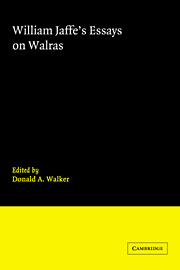Book contents
- Frontmatter
- Contents
- Preface
- Acknowledgments
- Introduction
- PART I WALRAS'S BIOGRAPHY
- PART II THE GENESIS AND DEVELOPMENT OF WALRAS'S IDEAS
- PART III THE SCOPE OF WALRAS'S WORK
- PART IV SPECIAL TOPICS IN WALRAS'S ECONOMICS
- 9 Léon Walras' theory of capital accumulation (1942)
- 10 Walras's theory of capital formation in the framework of his theory of general equilibrium (1953)
- 11 New light on an old quarrel: Barone's unpublished review of Wicksteed's “Essay on the coordination of the laws of distribution” and related documents (1964)
- 12 The Walras-Poincaré correspondence on the cardinal measurability of utility (1977)
- 13 Walras' theory of tâtonnement: a critique of recent interpretations (1967)
- 14 Another look at Léon Walras's theory of tâtonnement (1981)
- PART V WALRAS'S PLACE IN THE HISTORY OF ECONOMIC THOUGHT
- Index
12 - The Walras-Poincaré correspondence on the cardinal measurability of utility (1977)
Published online by Cambridge University Press: 05 May 2010
- Frontmatter
- Contents
- Preface
- Acknowledgments
- Introduction
- PART I WALRAS'S BIOGRAPHY
- PART II THE GENESIS AND DEVELOPMENT OF WALRAS'S IDEAS
- PART III THE SCOPE OF WALRAS'S WORK
- PART IV SPECIAL TOPICS IN WALRAS'S ECONOMICS
- 9 Léon Walras' theory of capital accumulation (1942)
- 10 Walras's theory of capital formation in the framework of his theory of general equilibrium (1953)
- 11 New light on an old quarrel: Barone's unpublished review of Wicksteed's “Essay on the coordination of the laws of distribution” and related documents (1964)
- 12 The Walras-Poincaré correspondence on the cardinal measurability of utility (1977)
- 13 Walras' theory of tâtonnement: a critique of recent interpretations (1967)
- 14 Another look at Léon Walras's theory of tâtonnement (1981)
- PART V WALRAS'S PLACE IN THE HISTORY OF ECONOMIC THOUGHT
- Index
Summary
It is surprising that in the very period when modern ‘mathematical economies’ was burgeoning forth so auspiciously as a novel science, there was, it appears, only one occasion on which Henri Poincaré (1858–1912), universally acclaimed for his versatility in applied as well as pure mathematics, brought his genius directly to bear on the application of mathematics to economics. His single passing glance in this direction is, nonetheless, of considerable interest, revealing, as it does, a profound insight on Poincaré's part into the economic implications of the question he was called upon to examine. This occurred when Léon Walras invited Poincaré to pronounce upon his controverted assumption of cardinal measurement of utility when it ran into more serious opposition than usual.
Walras had first made this assumption in 1873, in his maiden analytical paper, ‘Principe d'une théorie mathématique de l'échange,’, which he read in August of that year before the Académie des sciences morales et politiques in Paris. The relevant passage reads:
At this juncture, I seem indubitably to be straying from the straight and narrow path of science into regions of the unmeasurable. I hope to demonstrate that this is not the case. Of the two elements I have just mentioned [as data in the derivation of the demand curves], one is perfectly measurable, namely the quantity of each commodity initially owned by each trader. […]
- Type
- Chapter
- Information
- William Jaffe's Essays on Walras , pp. 213 - 220Publisher: Cambridge University PressPrint publication year: 1983



